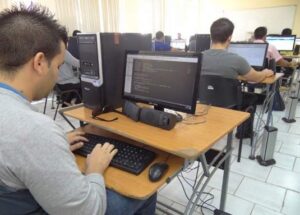 Beijing, China.- Cuban Minister of Education Ena Elsa Velazquez explained her country’s experiences in advancing the digital transformation of instructional processes on Tuesday, when speaking at a conference on the subject in China.
Beijing, China.- Cuban Minister of Education Ena Elsa Velazquez explained her country’s experiences in advancing the digital transformation of instructional processes on Tuesday, when speaking at a conference on the subject in China.
The minister pointed out that Cuba is working on a public policy in this regard, expanding its network of telematic services and to date it has connected 44.5 percent of schools with free services for students, teachers and families.
According to Velazquez, the curriculum seeks to develop digital skills and capabilities in students, and contemplates teachers’ training to support academic work and self-improvement.
She highlighted the emphasis made on fostering a culture of cybersecurity and on the creation of values and ethical standards in students as digital citizens.
Velazquez referred to the progress made on educational television with national channels, and programming and contents consistent with the curricula of each level of education in Cuba.
She stressed that despite constant work, the results do not always correspond to the efforts, due to the impact of the economic, financial and commercial blockade imposed by the United States, which affects the sector with difficulties to modernize the infrastructure, get equipment and access the necessary software.
However, the minister indicated that Cuban education seeks its insertion in the digital world with creative solutions to the challenges and obstacles along the way.
Velazquez ratified Cuba’s commitment to fulfilling the objectives of the 2030 Agenda for Sustainable Development of the United Nations, and the goal of offering citizens a more inclusive and quality education while assuming the process of digital transformations.
On the other hand, she criticized the increase in the world gaps due to the irresponsible use of technologies and their contribution to the escalation of global problems that put the sustainability of the planet and human existence at stake.
The Cuban minister of Education recalled that universal and effective connectivity is still a pending issue, defined as the possibility for all people to enjoy a safe, satisfying, enriching and affordable online experience.
Velazquez spoke via a video conference at one of the four sessions of the international conference on digital education, which took place on Monday and Tuesday in Beijing with the participation of 800 delegates from China, and from more than 100 countries and world organizations.